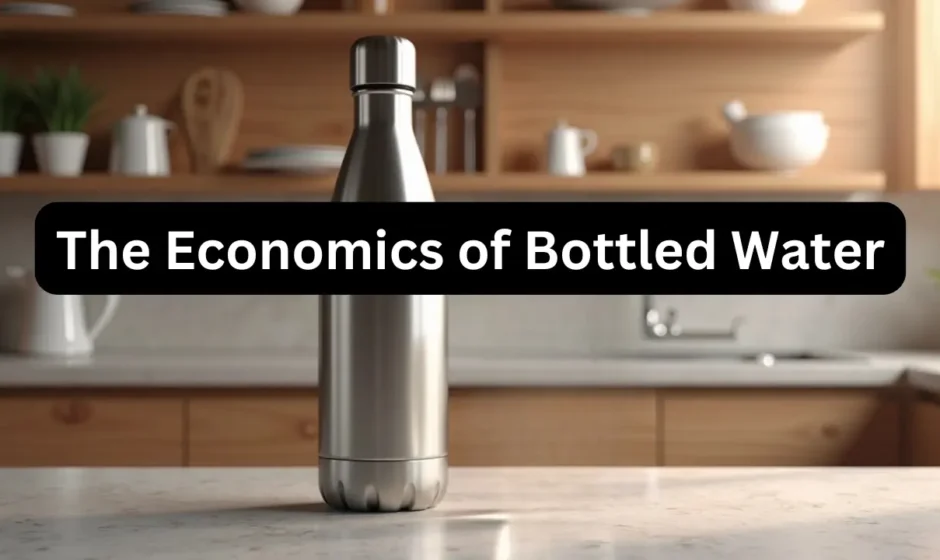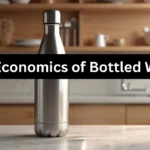Introduction
Bottled water has increasingly become a household essential, a convenient office choice and a hydration option of choice while on the go. But the convenience of bottled water is a really expensive one. Bottled water is often thousands of times more expensive than tap water — so much so that consumers might be wondering if it’s worth the money. In this article, we will analyse the economics of bottled water, dissect how much it costs, and compare the price to your alternatives such as tap water and filtration systems.
The High Cost of Bottled Water
Price Per Gallon
For a glass of water, bottled water ends up costing too much compared to the tap. The cost per gallon of bottled water is $1.22 on average. Tap water on the other hand costs less than a penny a gallon. This difference adds up over time in substantial savings for tap water users.
What makes bottled water expensive?
- Packaging: Plastic bottles and containers are responsible for a huge portion of cost in the production and disposal.
- Marketing: Bottled water brands splash lots of money on advertising campaigns to build the image that their products are pure and good quality.
- Transportation: The cost of shipping water bottled from production sites to retail outlets is added to the cost.
Hidden Costs
But the truth is, the price tag of water bottled doesn’t tell the full story: It takes a toll on the environment, as well as energy used to make and ship the bottles. But these indirect costs are often overlooked, and have huge effects on society and in the planet.
Annual Spending on Bottled Water
Household Budgets
water bottled can cost hundreds to thousands of dollars for an average family each year. The opposite though is that purchasing with tap water with an extra filtration system decreases this cost considerably.
Global Spending Trends
Bottled water is so expensive, yet it is consumed globally across the $200 billion bottled water market. The vast majority of this spending is for convenience, not necessity.
There are Affordable Alternatives to Bottled Water
Tap Water
The most economical of daily hydrations is tap water. For most municipal water systems, they have very strict regulations to follow so all of the water is basically clean and safe and super cheap to get compared to bottled water.
Water Filtration Systems
A home filtration system is a cost effective way to improve the quality of tap water. Filtration systems can run off the simple premise of pitcher filters to the more advanced under sink systems, there’s an option suitable for any budget.
Reusable Water Bottles
A reusable water bottle is perfect: no single use plastic bottles and it saves money while also reducing your impact on the environment. They are made from stainless steel and glass, both durable and durable, ecofriendly, and affordable.
The Long-Term Cost of Water Bottle
Financial Impact
One person who consumes an average of three bottles of water a day spends $1,095 per year, versus $1.50 for the same quantity of tap water. This comes to almost $11,000 in savings over the life of a decade.
Environmental Cost
Plastic bottles produce pollution and many are dumped in landfills or in the oceans. Often, these environmental costs are simply passed on in the form of cleanup efforts — that are paid by the taxpayer.
Economic Benefits of Reducing Water Bottled Use
Savings for Households
If you’re spending dollars on bottled water, switch to tap water or filtration systems to save some cash for essentials or investments. There could be tremendous savings, even over small changes such as using a refillable bottle.
Public Infrastructure Support
When they tap water, consumers support public water systems and push for investment in infrastructure improvements that result in benefits for whole communities.
Job Creation in Sustainable Industries
Through investments in sustainable water solutions (filtration systems, public water refill stations) jobs will be created and economic growth stimulated.
Bottled water buying habits: psychological factors.
Perceived Quality
Although studies show that a great deal of water bottled is simply distilled municipal tap, many consumers associate bottled water with better quality.
Convenience
Water bottled is readily available and certainly ready to drink, which is a convenience in a busy life.
Social Status
Some premium water bottled brands have positioned themselves as luxury products as an item so people are convinced it is the symbol of a status it can give them.
Water Saving Practical Tips to Reduce costs.
When possible use Tap Water
- You can install a home filtration system to make it taste better, and to filter out impurities.
- As for portability, use a reusable water bottle.
Buy Water Bottle in Bulk
Buying water bottled in bulk can also help save money when it’s needed. Instead try to find discounts on a larger pack, instead of a single bottle.
Educate Others
Encourage your friends and family to share the financial and environmental benefits of reducing water bottled consumption, and do it collectively, as it can be saving!
When Bottled Water May Be Worth the Cost
While tap water is the better choice for most scenarios, there are situations where water bottled may be necessary:
- Travel: Bottled water is a better alternative in place where tap water quality is in doubt.
- Emergencies: During natural disasters or infrastructure failure, water bottled assures to clean drinking water.
- Health Needs: water bottled can be an additional ‘insurance’ for people with suppressed immune systems.
Conclusion
In other words, water bottled is now the least environmentally friendly and a less economical source of hydration. This is especially true with filtered tap water. It’s an affordable and safe, and in many places, a sustainable alternative. Consumers can save money and save the environment by swapping out plastic drinks bottles for refillable alternatives — or by simply buying a filter system. Bottled water isn’t a bad thing to have, of course, in case of emergencies or away on travel (or any time you wouldn’t have water available to you), but most of the time, drinking water bottled as your main source of hydration is not worth the cost.


